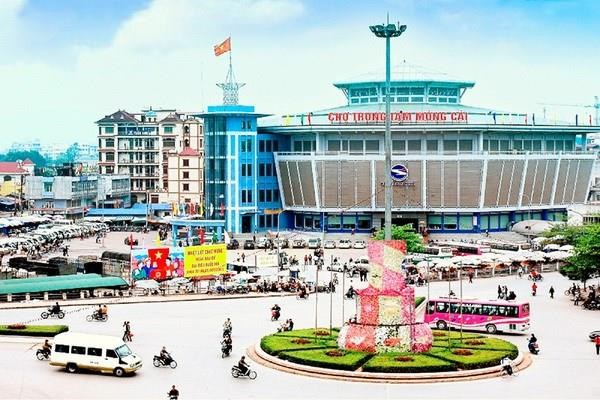
Mong Cai was recognised as a second-tier city of Quang Ninh province in 2018 (Photo: baoquangninh.com.vn)
The attractiveness of Mong Cai is attributable to its good economic development and transport infrastructure, especially thanks to the Mong Cai Border Gate Economic Zone (EZ).
The EZ consists of the entire Mong Cai city along with nine communal-level localities of Hai Ha district. It has a total area of 121,197ha, including 66,197ha of land and 55,000ha of sea surface.
According to a report sent to the Ministry of Planning and Investment last May by the Quang Ninh provincial People’s Committee, the EZ has recorded strong socio-economic improvements over the past years.
Local transport infrastructure has been developed synchronously. Construction of Van Don – Mong Cai Expressway kicked off on April 3 this year, and it will directly connect with the expressway traversing Hanoi, Hai Phong city and Quang Ninh’s Ha Long and Van Don. Meanwhile, the temporary road linking Mong Cai with Dongxing town of China has also been completed.
This EZ’s contribution to the province’s economy is considerable as the trade revenue via the Mong Cai Border Gate approximated 16.59 billion USD between 2016 and 2018.
Additionally, more than 2.7 million people exited Vietnam via this port of entry, through which another over 2.9 million entered the country in 2018. The figures are expected to amount to 2.9 million and 3.1 million, respectively, this year. Meanwhile, the statistics in other border gates of Quang Ninh are less than 30,000 people per year.
The Mong Cai Border Gate EZ is also a concentration of labourers. Last year, there were nearly 76,000 labourers in the zone, compared to about 2,300 in the Bac Phong Sinh Border Gate EZ and 4,500 in the Hoanh Mo – Dong Van Border Gate EZ, also in Quang Ninh province. It is hoped to raise this number to 78,800 by the end of 2019 and 102,000 by 2025.
With these results, the Mong Cai Border Gate EZ is not only the busiest one in Quang Ninh but has also helped the province rank first in terms of economic activities among the seven Vietnamese localities bordering China.
Aside from vibrant economic activities and good transport infrastructure, the EZ also boasts a lot of tourism potential. From 2010 to 2015, tourism revenue of Mong Cai city grew 3.7 percent annually to almost 2.88 trillion VND. The city also posted a surge in the number of tourist arrivals to 2.7 million last year. This is a driving force for the investment flow into resort property in the city.
The Mong Cai City People’s Committee said in June that the administration of Quang Ninh province had given permission in principle to five big Vietnamese developers to make investment plans in the city. Among them, Vingroup proposed three projects, FLC group four and Sun Group one.
With strong moves by giant real estate developers, the land and house segments are also warming up. Many projects with completed infrastructure are recording strong sales like Kalong Riverside City or Green Park.
The local property market is benefiting from what is the busiest border gate EZ in the north of Vietnam in terms of trade, services and tourism.
This is also the panorama of the real estate market in Quang Ninh province.
Many big names in the sector have chosen to invest in the coastal province, attracted by good infrastructure and the local government’s policies designed to facilitate investment.
Ten years ago, Quang Ninh ranked 58th in the Provincial Competitiveness Index (PCI), but it has risen quickly to the top five and kept the place among the top group for several recent years. In particular, in 2017, the province rose to the first place and maintained this position in 2018.
This is one of the reasons why Quang Ninh province has been attracting more and more investors.
Since 2014, the number of real estate projects implemented in Quang Ninh has surpassed 100, with total investment capital amounting to 5.5 billion USD, ranging from resort, entertainment park to shop house and apartment building./.